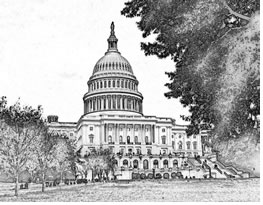
Or Closer to Home
You don't have to be a C-SPAN junkie to appreciate the fact that the work of Congress affects you, your livelihood, and how you practice architecture. Just a few examples from the 106th Congress—preservation of qualifications-based selection (QBS) in the federal sector, funding for brownfields redevelopment, TRAC legislation, and school construction and modernization—exemplify how lawmakers can help (or hinder) the business of design professionals.
 Legislators
want to know how the actions they take will affect their constituents,
and are eager to learn about the issues facing the people they represent.
As an architect, you have insight and expertise that is useful to your
members of Congress. They may not always agree with your position on certain
issues, but they are always interested in listening to what professionals
residing or working in their districts have to say.
Legislators
want to know how the actions they take will affect their constituents,
and are eager to learn about the issues facing the people they represent.
As an architect, you have insight and expertise that is useful to your
members of Congress. They may not always agree with your position on certain
issues, but they are always interested in listening to what professionals
residing or working in their districts have to say.
This guide is offered now for participants in Grassroots 2002, the AIA's annual Leadership and Legislative Conference for component executives and officers, February 27–March 1. However, what is true nationally is also true at the state and local level. If you are not traveling to Washington, D.C., you still can use these tips to work with other elected officials, such as local commissioners and state representatives, so you can renew your relationships—or begin new ones—with the men and women who represent you at all levels of government.
Helpful hints for congressional visits
Here are some tips to keep in mind as you prepare for, participate in, and follow-up with your lawmaker.
Before your visit:
• Prepare an issue brief: You can help focus the meeting if
you bring an issue brief or position paper to your meeting to give to
your representative or to the staff. Ideally, the brief should help clarify
the issue and put your arguments in a favorable light. Remember, your
big advantage is that you are a constituent—you have first-hand knowledge
about how these issues affect your district and you can share valuable
insights with the representative or the staff. You can find AIA-prepared
issue briefs and talking points on the Institute's 2002 legislative priorities
(listed in the reference box at right) by accessing
MyAIA, going to the Portal Directory, and accessing the Grassroots
2002 folder under Government Affairs.
 •
Know where your representative stands: Before your meeting, determine
if your representative is a co-sponsor of a bill you are discussing or
if they have spoken out about this legislation or issue. Helpful Web sites
include Thomas, Legislative
Information on the Internet, and the "news" or "press
release" section of the member's Web site. Your governor's Web site
and contact information can be found through the National
Governors' Association and many locally elected bodies have information
on the Internet as well. See the reference section sidebar for more information.
•
Know where your representative stands: Before your meeting, determine
if your representative is a co-sponsor of a bill you are discussing or
if they have spoken out about this legislation or issue. Helpful Web sites
include Thomas, Legislative
Information on the Internet, and the "news" or "press
release" section of the member's Web site. Your governor's Web site
and contact information can be found through the National
Governors' Association and many locally elected bodies have information
on the Internet as well. See the reference section sidebar for more information.
During your visit:
• Relax!: Your congressional representatives will be glad
to see you. Because of their diverse and demanding schedules, however,
your visit may be brief. Remember to be direct, concise, and to the point.
• The right address: If you are not on a first-name basis with your representative, address him or her as "congressman," "congresswoman," or "senator." Address congressional staff as you would any other business professional.
• Start with local small talk: You will probably have three minutes or so for small talk at the beginning of your meeting. Use the time to chat about your district—sports teams, school bond issues, local events—to connect with what is going on back home. Use this time to establish a bond with people in the congressional office. You may be more knowledgeable about certain issues and late-breaking news than the folks in that office. Let them see you as a source of valuable information.
• All politics is local: Representatives and senators are always more receptive to arguments that affect their districts or home states. For example, tell your congressional member how school construction legislation would help revitalize a particular school in your town. You gain their respect when you can demonstrate knowledge of your representative's district. Whenever possible, you may also relate the issue you are discussing to your own personal experiences.
• Don't bluff: If you are asked a question and you don't know the answer, don't make one up. It's always better to say, "Good question. I don't have the answer, but let me check on it and get back to you." This keeps your credibility intact and presents you with an opportunity to continue the dialogue and touch base again.
When you get home:
• Follow up: Congressional presentations on issues are only
effective when there is follow through. When you arrive home, make a special
effort to send your member of Congress a short note of appreciation for
the meeting and reiterate what you discussed. If you promised to send
additional information, now is the time to do it. Furthermore, you can
invite him or her to speak before your local AIA chapter. The object is
to establish a bond between the member of Congress and the AIA. Nurture
the relationship, and you can both reap its rewards.
Other notes:
• Staff visits: If your congressional representatives are
not available for visits, set up appointments with the appropriate members
of their staff. Congressional staff members are well-versed on a broad
range of topics and play a critical role in the development of legislation.
This is also true for locally elected officials. Afford the staff the
same courtesy you would to the member of Congress and remember to send
a thank you and/or follow up information to them, too.
• Power in numbers: Whenever possible, the AIA recommends that you meet as a group with your elected officials. Not only will this strengthen your lobbying effort, it will also respect the time of your lawmakers. There should be one point of contact with your local component to avoid setting up duplicate meetings with the same member of Congress.
• Gifts: Congressional gift restrictions prevent members of Congress and their staff from accepting any type of gift. Please refrain from offering any gift to your member's office.
Copyright 2002 The American Institute of Architects. All rights reserved.
![]()
|
The AIA's 2002 legislative priorities are: • Building Security Through Design • The Truthfulness Responsibility and Accountability in Contracting Act (TRAC) • Energy Efficiency in Buildings • School Modernization. Useful links . . . Thomas, Legislative Information on the Internet Link to your representative's Web site. Link to your senator's Web site. National Governors' Association |
|